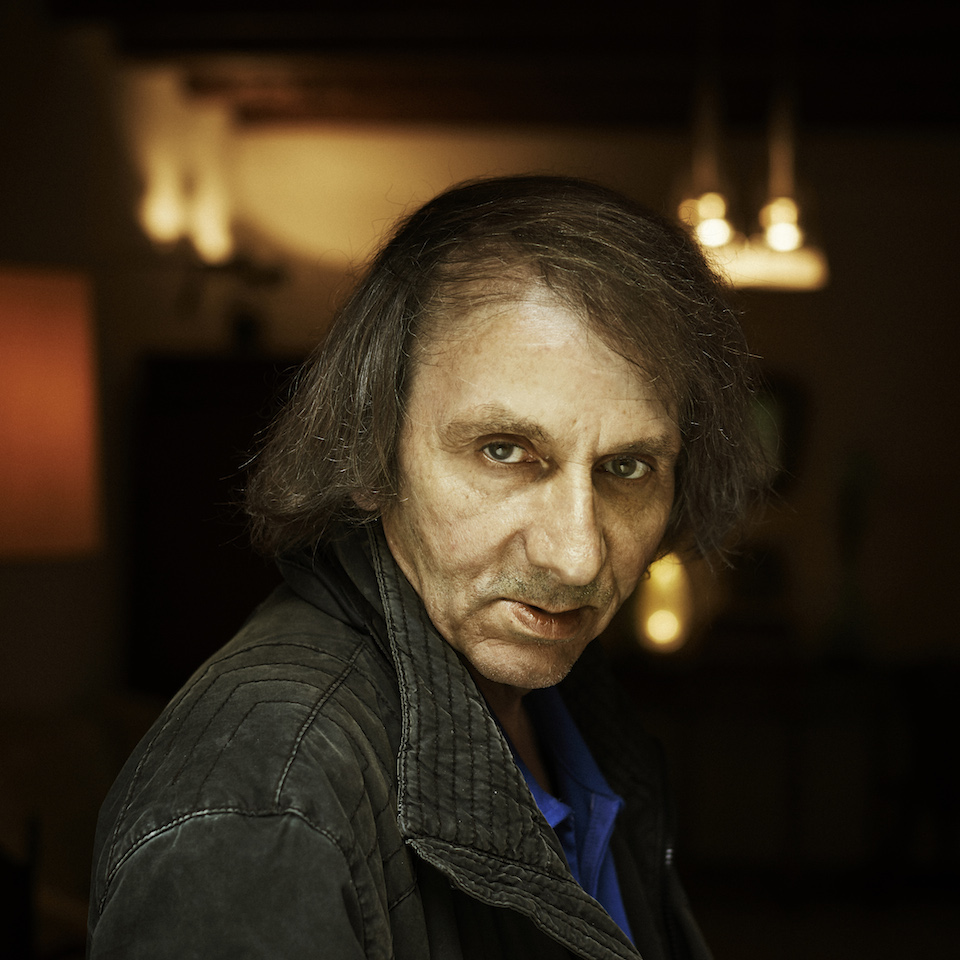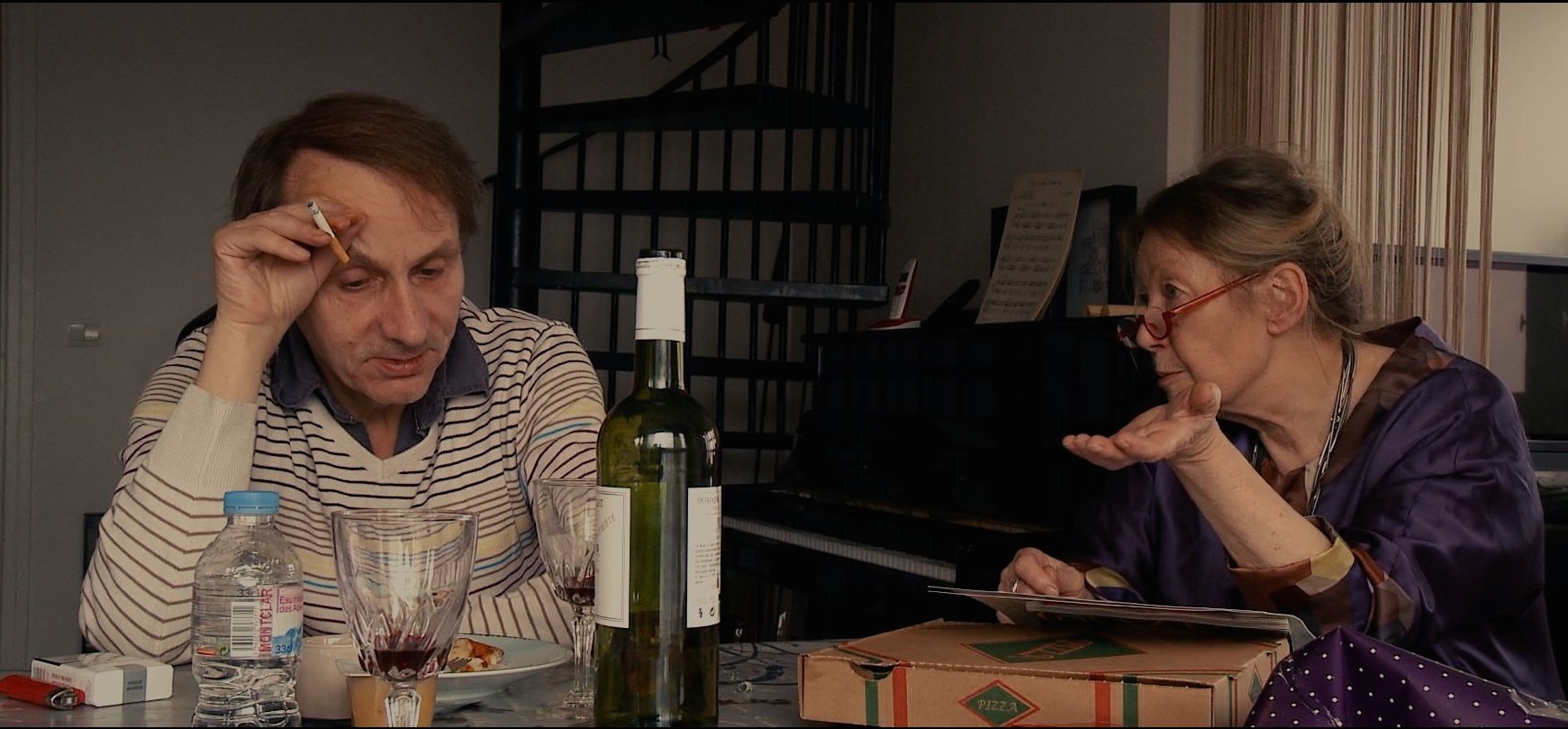For a few moments near the beginning of The Kidnapping of Michel Houellebecq, the novelist (starring as himself) sits glumly passive with a strip of duct tape over his mouth while his three kidnappers get ready to spirit him out of his apartment. It’s a witty image—the compulsive provocateur finally forced to shut up—and not surprisingly it forms the main publicity shot for the movie. What pent-up outrages, you wonder as you look at it, are going to burst forth when the tape comes off?
As it happens, Guillaume Nicloux’s film (which was inspired by an incident, or non-incident, in 2011 when Houellebecq forgot to show up for a book tour, prompting wild theories that he had been kidnapped) plays cannily against expectations. What could easily have just been a vehicle for Houellebecq’s dependably scandalizing pronouncements turns out to be something more interesting: a portrait of the highly complicated personality in which those pronouncements gestate. Instead of polished barbs about Islam or feminism, we get a sort of muttering, murmuring stream of lowkey but amusing charm, petulance, and passive aggression, as Houellebecq passes the time with his kidnappers in their tumbledown rural hideaway, waiting for someone to ransom him.
It’s quite a performance. The novelist plays himself as a slightly malicious goblin, perpetually wreathed in smoke from the cigarettes wobbling horribly between third and fourth finger as he probes his captors’ vulnerabilities and purrs his way into their affections. What Nicloux seems to have recognized is that Houellebecq’s appeal has to do with something more creaturely, more bodily even, than simply his well-furnished intellect, or his gift for causing offense, or even his originality as a novelist. You get a sense of this physical orientation in a work like Public Enemies (2011), the epistolary exchange between Houellebecq and Bernard-Henri Lévy, where, in contrast to the philosopher’s lofty insistence on “human dignity” as the touchstone for all his beliefs, the novelist sources his own views in more rudimentary things, such as his thwarted desire to smoke at all times and in all places. But it’s a quality that a movie, or a movie-maker with an appreciation of the human figure and physiognomy, can convey more vividly than a book, and Nicloux has the good sense to anchor nearly every scene of this sublimely dotty film in Houellebecq’s singular physical appearance, above all the extraordinary landscape of his face.
At fifty-seven, Houellebecq has the miraculous look of someone almost double his age. Etched, haggard, battered, half-collapsed, his face seems destined to become one of the great ruins of our literary era; something to measure up to Beckett or Auden—for druidic ancientness if not quite nobility. His mouth in particular rivets attention. Downturned like his beloved Baudelaire’s, it is also alarmingly caved-in, as though his mother had followed through on her notorious threat to smash his teeth in with her walking stick if he ever wrote about her again (she’s the delinquent hippie mother in The Elementary Particles). It has a sort of specialized supportive musculature that seems evolved to express infinitely fine gradations of disenchantment, and Nicloux rightly lingers on it whenever he can.
Setting off these features are those of the three kidnappers. Two of them, a martial arts instructor and a bodybuilder (also playing “themselves”), are more or less in the Genet mold of sensitive, good-looking toughs. They seem to have been cast largely for their air of guileless vulnerability, a quality that enables Houellebecq to turn them into his personal equerries without difficulty, dispatching them on errands for books, cigarettes, and wine in return for a few half-hearted (but eagerly lapped up) words of writerly wisdom. The third, Luc, is more of a force: a mountainous gypsy with a small, beaked face on an enormous pitted chin—a granite owl to Houellebecq’s leathery pussycat—who has taken the trouble to read some of the novelist’s work by way of preparation for kidnapping him, and found himself uncomfortably enjoying it. With his explosive amour propre, which Houellebecq laconically offends at every opportunity, Luc emerges as a kind of enraged fan, one of the exasperated admirers Houellebecq tends to attract (myself among them). The exchanges between these two, especially a sequence in which the diminutive writer almost breaks the giant’s elbow while wrestling with him, have a cruel humor you don’t often encounter these days. It’s oddly bracing.
Also part of this carefully constructed human tableau are the elderly parents of one of the kidnappers, who own the house where Houellebecq is being held. Cheerfully indifferent to the crime taking place under their roof, they are nevertheless kindness itself to their manacled guest. The mother bakes a birthday cake for him and tucks him in at night; the father shows him his refurbished old cars. Beyond absurd as all this is, the verité-style directing and acting, along with the choppy editing, saves it from reading as some kind of sleekly self-conscious fable. You feel disconcertingly present throughout, as you might in the home movies of some particularly weird neighbors. Only in retrospect did it dawn on me that this ménage was being offered as a sort of warped, Houellebecqian ideal of family life, complete with fully subjugated siblings and limitlessly indulgent parents. At one point the mother asks Houellebecq if he would like to watch some porn. Ever disobliging, the novelist replies that he’d rather have an actual girl. A “girl” is duly procured and the old lady ceremoniously escorts Houellebecq into her presence.
Advertisement
It’s at this juncture that the film does, in its own way, converge with the preoccupations of its subject’s books, giving them a jolt of unsettlingly graphic immediacy. It’s one thing to read about the universal benefits of prostitution and sex tourism in a novel like Platform; another to see the wizened author in bed with a naked young prostitute; something else again to learn that her name is Fatima. A more inflammatory image of the clash of civilizations would be hard to conceive. It will appall some people—it’s surely intended to. But its final effect, like so much in Houellebecq’s own writing, is to spread its sting backward and inward as well as outward into its apparent target, provoking something more like bemused pensiveness, in the end, than shock.
By many accounts Houellebecq’s new novel, Soumission (Submission), is less an attack on Islam than a lament for the decay of a certain notion of French civilization. (“If there is an idea, a single idea that runs through all of my novels” Houellebecq writes in Public Enemies, “it is the absolute irreversibility of all processes of decay once they have begun.”) Exploited as Fatima is (and cheated too), the sheer gleaming vigor of her physical presence in this blighted setting makes it difficult to regard her as anyone’s victim. And from the way the story plays out it seems that the exploiter is doomed to lose the upper hand in the relationship, and what’s more, that he is happily resigned to losing it. Total soumission, indeed, seems imminent.
“My desire to displease masks an insane desire to please.” Houellebecq declares elsewhere in Public Enemies. “But I want people to like me ‘for myself,’ without trying to seduce, without hiding whatever is shameful about me…I doggedly, relentlessly seek out that which is worst in me so that I can set it, still quivering, at the public’s feet.” What Nicloux’s film has assisted him in laying out may not be likable exactly, but it is definitely quivering—pulsing with a strangely communicative vitality.
Guillaume Nicloux’s The Kidnapping of Michel Houellebecq will begin a two week run at Film Forum in New York on March 25.




